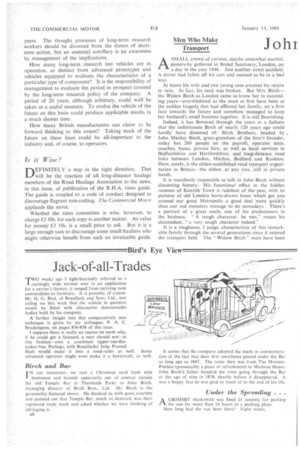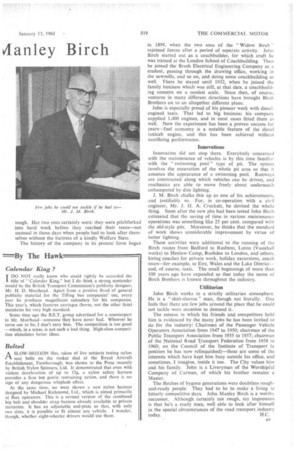Johi
Page 42

Page 43

If you've noticed an error in this article please click here to report it so we can fix it.
danley Birch
ASMALL crowd of curious, maybe somewhat morbid. passers-by gathered in Broad Sanctuary, London, on a day in the year 1846. Just another street accident. A driver had fallen off his cart and seemed to be in a bad way.
At home his wife and two young sons awaked his return in vain. In fact, his neck was broken. But Mrs. Birch— the Widow Birch as London came to know her in succeeding years—overwhelmed as she must at first have been at the sudden tragedy that had afflicted her family, set a firm face towards the future and somehow managed to keep her husband's small business together. It is still flourishing.
Indeed, it has flowered through the years in a fashion that the unfortunate Birch of nearly 120 years ago could hardly have dreamed of: Birch Brothers, headed by . John Manley Birch, great-grandson of the firm's founder, today has 200 people on the payroll, operates taxis, coaches, buses, private hire, as well as local services in Bedfordshire and Hertfordshire, and long-distance road links between London, Hitchin, Bedford and Rushton. Here, surely, is the oldest-established road transport organization in Britain—the oldest, at any rate, still in private hands.
It is manifestly impossible to talk to John Birch without discussing history. His functional office in the hidden recesses of Kentish Town is redolent of the past, with its pictures of old London horse-drawn buses which got you around our great Metropolis a good deal more quickly than our red monsters manage to do nowadays. There's a portrait of a great uncle, one of his predecessors in the business. " A tough character, he was," muses his descendant, "a very tough character indeed."
It is a toughness, I judge, characteristic of this remarkable family through the several generations since it entered the transport field. The "Widow Birch" must have been tough. Her two sons certainly were: they were pitchforked into hard work before they reached their teens—not unusual in those days when people had to look after themselves without the buttress of a kindly Welfare State.
The history of the company in its present form began
in 1899, when the two sons of the "Widow Birch• rejoined forces after a period of separate activity. John Birch started out as a coachbuilder, for which craft he was trained at the London School of Coachbuilding. Then he joined the Brush Electrical Engineering Company as a student, passing through the drawing office, working in the sawmills, and so on, and doing some coachbuilding as well. There he stayed until 1932, when he joined the family business which was still, at that date, a coachbuilding concern on a modest scale. Since then, of course, ventures in many different directions have brought Birch Brothers on to an altogether different plane.
John is especially proud of his pioneer work with dieselengined taxis. That led to big business: his company supplied 1,400 engines, and in most cases fitted them as well. Now the experiment has been a proven success for years—fuel economy is a notable feature of the diesel taxicab engine, and this has been achieved without sacrificing performance.
Innovations
Innovation did not stop there. Everybody concerned with the maintenance of vehicles is by this time familiar with the "swimming pool" type of pit. The system involves the excavation of the whole pit area so that it assumes the appearance of a swimming pool. Runways are constructed along which vehicles can be driven, and mechanics are able to move freely about underneath unhampered by dim lighting.
J. M. Birch chalks this up as one of his achievements, and justifiably so. For, in co-operation with a civil engineer, Mr. J. El. A. Crockett, he devised the whole thing. Soon after the new pits had been tested John Birch estimated that the saving of time in various maintenance operations was something like 25 per cent, compared with the old-style pits. Moreover, he thinks that the standard of work shows considerable improvement by virtue of better lighting.
These activities were additional to the running of the Birch routes from Bedford to Rushton, Luton (Vauxhall works) to Henlow Camp, Rushden to London, and others, hiring coaches for private work, holiday excursions, coach tours—for example, to Eire, Wales and the Lake District— and, of course, taxis. The small beginnings of more than 100 years ago have expanded so that today the name of Birch Brothers is known throughout the industry.
Utilitarian John Birch works in a: strictly utilitarian atmosphere. He is a " shirt-sleeves " man, though not literally. One feels that there are few jobs around the place that he could not tackle were occasion to demand it.
The esteem in which his friends and competitors hold him is evidenced by the many jobs he has been invited to do for the industry: Chairman of the Passenger Vehicle Operators Association from 1947 to 1950; chairman of the Public Transport Association from 1955 to 1957; chairman of the National Road Transport Federation from 1958 to 1960; on the Council of the Institute of Transport (a position he has now relinquished)—these are some of the interests which have kept him busy outside his office, and sometimes, I imagine, inside it too. The City values him and his family. John is a Liveryman of the Worshipful Company of Carmen, of which his brother remains a Master.
The Birches of bygone generations were doubtless roughand-ready people. They had to be to make a living in bitterly competitive days. John Manley Birch is a worthy successor. Although certainly not rough, my impression is that he's a ready man, well able to took after himself in the special circumstances of the road transport industry
today. H.C.




















































































































































